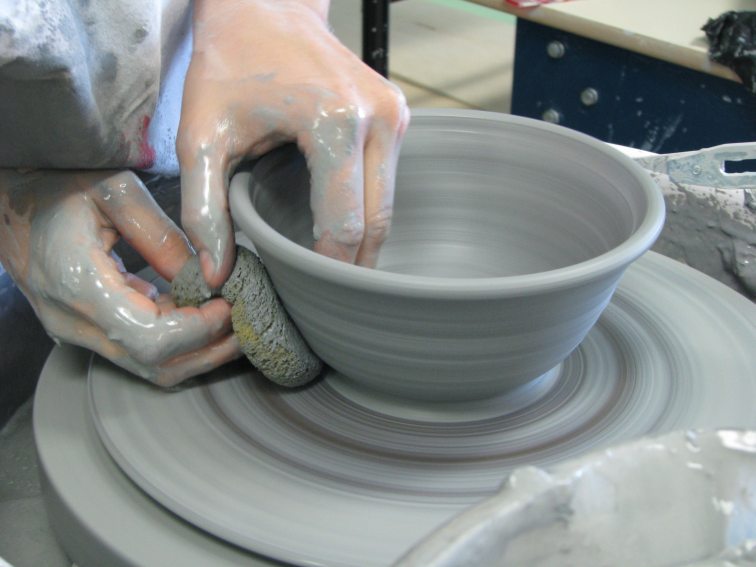One school holiday I took a pottery class. While attempting to shape a ceramic cereal bowl on a pottery wheel, the instructor asked me “Are you a teacher?” Shocked that he could pick this so easily, I told him I was. He replied, “I can tell. You are trying so hard to control the clay instead of letting it move.”
While my, uh, quirky (?) ceramic cereal bowl may not have been specific or orderly, the experience was certainly meaningful and memorable.
I tell this story as it relates to one of the best education-related quotes I’ve heard in a long time. Again, it is by American author and lecturer Alfie Kohn;
“Good teachers have teeth marks on their tongues.”
Sometimes teachers need to let go. Sometimes we need to shut up, because, as Alfie Kohn asserts;
“Deep thinking is really messy. Therefore beware prescriptive standards and outcomes that are too specific and orderly. Teaching, like parenting and managing, is greatly improved by following a four-word admonition: Talk less, ask more.”
When testing and assessment, time pressure and content drive our pedagogy, it’s easy for teachers to talk too much and control too much. But it’s paramount that we reflect on our practice, hush up a bit and relinquish some control.
In Alison King’s excellent article From Sage on the Stage to Guide on the Side, she explores the outdated teaching model of the teacher as “the one who has the knowledge”; who transmits it to students, as if their brains were a container. In this ‘transmittal’ model, students are passive, rather than active, learners. King argues this model is ineffective for 21st Century learners, who will “be expected to think for themselves, pose and solve complex problems, and generally produce knowledge rather than reproduce it.”
Similarly, John Dewey describes “the old education” as an approach in which “the centre of gravity is outside the child. It is in the teacher, the textbook, anywhere and everywhere you please except in the immediate instincts and activities of the child himself.”
So, what should we shift to? The change needed, or the Copernicus-like ‘revolution’ as Dewey describes it, is, “the shifting of the centre of gravity… the child becomes the sun about which the appliances of education revolve; he is the centre about which they are organized.”
King asserts that in order to achieve this shift, teachers must move to orchestrate the context, be the facilitator and provide resources which encourage students to think up their own answers. In essence, teachers must hold their tongues more often; be less of a sage and more of a guide.
Film yourself teaching and you may notice the moments when you ‘fill in the blanks’ for students, or give the answer too soon. You may be doing the thinking for the students and cherry-picking information you deem most important. Perhaps you are presenting a topic in a way which limits critical thinking or problem solving; essentially, filling the empty containers who sit before you. Ask yourself, are students active or passive?
Rather than just memorizing information, active learning means “getting involved with the information presented…really thinking about it” (King). It involves analyzing, synthesizing and evaluating, and according to King, it “always leads to deeper understanding.” Students must be prompted to engage in active learning, and King suggests that for every major topic we cover, we must accompany it with an opportunity for students to generate meaning in an active way. For example, King lists think-pair-share, peer questioning and group work (amongst many others) as strategies to increase student achievement. These strategies are in no way earth shattering, but the focus on active learning must be embedded into our regular practice if students are to become the critical thinkers and creative problem solvers that the twenty-first century demands.
The benefits of holding our tongues are profound. According to Kohn, when teachers share the power with their students, “One’s job becomes a good deal more interesting” because “allowing people to make decisions about what happens to them is inherently preferable to controlling them.”
It’s important to note that being a ‘guide on the side’ does not mean less work for the teacher. “There is no zero-sum game in which more responsibility for the children means less for the adults. Helping students to participate effectively takes talent and patience and hard work,” suggests Kohn.
It’s easy to fall into patterns and habits in our teaching, and miss the opportunities for increased student ownership and participation. If teachers can be open-minded, flexible and reflective, then not only will students benefit in terms of their well-being, behaviour and academic achievement, but it could also transform the role that we play as teachers, or ‘guides’.

Good stuff as always, Mel. It’s a pity that at the age of seventy I find it just makes me feel tired to realise what an ordinary teacher I have been — but obviously it isn’t about me!
LikeLike
Hi Barb! So sorry for my tardy reply on your Safe Schools comment to me on the last post – I didn’t see it until yesterday! Thank you for stopping by again and commenting, it is always a treat to hear from you! When I think of you the word ‘ordinary’ does not come to mind at all – the students are lucky to have you! I’d love to get your email address to stay in touch. Mine is ralphmelanie@gmail.com drop me a line some time! 🙂
LikeLike
Lovely poost
LikeLike
Thanks for reading, Grant 🙂
LikeLike